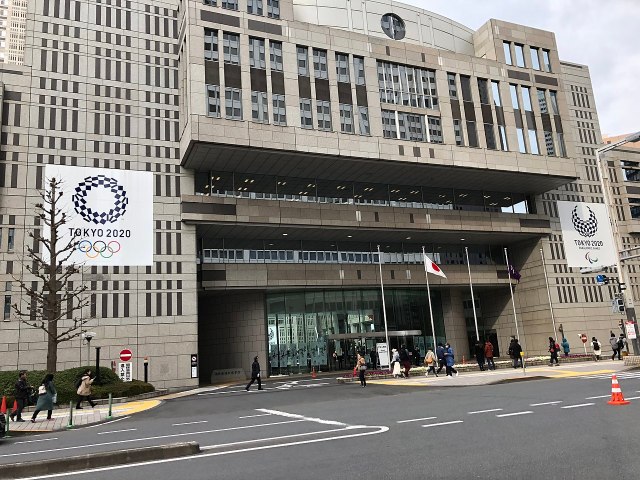
Postponing Games due to coronavirus is not an easy option, official says.
The coronavirus has spread rapidly since its 2019 inception in Wuhan, China, with cases currently confirmed in 45 territories. Japan has seen the fifth most, with 172 cases and 2 confirmed COVID-19 deaths, leading to an increased demand for face masks and increased paranoia and xenophobia around foreigners, particularly tourists.
Japan has a uniquely complicated scenario, as the country is currently preparing for a huge influx of foreign athletes and and even huger influx of tourists coming to watch them compete in the 2020 Tokyo Olympics, which are scheduled to start on July 24. That’s now less than five months away, and fears about the widespread COVID-19 virus are starting to cause doubts the Olympic Games will even go ahead at all.
Dick Pound, who competed in the 1960 Summer Olympics, is the longest-serving member on the International Olympics Committee. In an interview with the Associated Press, Pound explained how preparations for the Olympics become increasingly intense as the scheduled opening date gets closer. “You’ve got to start ramping up your security, your food, the Olympic Village, the hotels. The media folks will be in there building their studios.”
However, should coronavirus-related concerns and delays make the Tokyo Olympics will be unable to meet their scheduled start date, Pound told the AP that “you’re probably looking at a cancellation,” not a postponement or rescheduling.
Pound says that a global-scale operation like the Olympics operates in a very tight “bubble”. All manner of global sports stations write up tight agreements about Olympic coverage so they can dedicate time-slots to each event; rescheduling the games even by a few months would throw off this delicate balance. He cited North American broadcasting companies in particular as an issue, as their fall schedules are packed to the brim with basketball, hockey, professional and college football, and so on. This, plus inherent problems with shifting the event to other, lesser-equipped venues in other countries, means that Pound sees cancellation as the only realistic response if Tokyo can’t meet the July 24 opening date, and the committee will have to decide whether or not to do so by the end of May at the latest.
However, Pound stresses that athletes should presume for now that the games will go ahead as planned, telling the AP “As far as we all know, you’re going to be in Tokyo. All indications are at this stage that it will be business as usual. So keep focused on your sport and be sure that the IOC is not going to send you into a pandemic situation.” He also sounded much more optimistic when speaking to the BBC, saying “We have to think of alternatives. Could you still hold them this year? We would speak with the Japanese government to ask them if this ‘bubble’ can be held in place.”
Within Japan, online reactions have mainly been focusing on the worst-case cancellation scenario. Many see Pound’s comment as a confirmation that the Olympics is decided at the whims of the American media, regardless of the hosting country’s wishes; one cynically called the Olympics itself as an “American organization”. Others wondered whether or not postponing the Games by one year would offset these problems (Pound was doubtful in his original interview, citing the huge budget that Japan had already put aside for this year).
One commenter summed the general opinion up neatly:
“Wow, so it all really does come down to money.”
While the Olympic Games have been cancelled before, such cases were due to ongoing wars. The first time for the Olympic Games to take place in Tokyo was supposed to be in summer of 1940, for example but were cancelled because of World War II. No modern Olympic Games have ever been cancelled for health reasons, not even 2016’s Summer Olympics Games in Rio de Janeiro, which proceeded as planned, despite concerns over the Zika virus epidemic. This is an especially fraught time when Japan could use the boost of international solidarity that the Olympic Games can bring, but let’s hope it doesn’t come at the cost of public health safety.
Source: Associated Press via Hachima Kiko, BBC
Top image: Wikimedia Commons/Maythee Anegboonlap
● Want to hear about SoraNews24’s latest articles as soon as they’re published? Follow us on Facebook and Twitter!

 IOC President is “in 100-percent agreement” with Japan’s proposal to postpone Tokyo Olympics
IOC President is “in 100-percent agreement” with Japan’s proposal to postpone Tokyo Olympics Tokyo Olympics loses first participant as Canada withdraws from Games over coronavirus concerns
Tokyo Olympics loses first participant as Canada withdraws from Games over coronavirus concerns Tokyo Olympics will take place as scheduled “with or without COVID” says IOC exec
Tokyo Olympics will take place as scheduled “with or without COVID” says IOC exec Tokyo Olympics announces new start date following coronavirus postponement
Tokyo Olympics announces new start date following coronavirus postponement Japanese Prime Minister Shinzo Abe proposes postponing Tokyo Olympics for up to one year
Japanese Prime Minister Shinzo Abe proposes postponing Tokyo Olympics for up to one year Japan Extreme Budget Travel! A trip from Tokyo to Izumo for just 30,000 yen [Part 1]
Japan Extreme Budget Travel! A trip from Tokyo to Izumo for just 30,000 yen [Part 1] Starbucks Japan releases first-ever Hinamatsuri Girls’ Day Frappuccino
Starbucks Japan releases first-ever Hinamatsuri Girls’ Day Frappuccino Japanese drugstore sells onigiri at pre-stupid era prices, but how do they compare to 7-Eleven?
Japanese drugstore sells onigiri at pre-stupid era prices, but how do they compare to 7-Eleven? Coordinating a whole outfit with nothing but clothes from Japanese convenience store Family Mart
Coordinating a whole outfit with nothing but clothes from Japanese convenience store Family Mart Rare 1990 Hayao Miyazaki interview surfaces, shows the director “not as salty as usual”【Video】
Rare 1990 Hayao Miyazaki interview surfaces, shows the director “not as salty as usual”【Video】 It’s a trap (Japanese capsule toy)!
It’s a trap (Japanese capsule toy)! Step back in time to the Edo period at this unusual highway rest stop in Japan
Step back in time to the Edo period at this unusual highway rest stop in Japan Beautiful blue apple jam is taking the Japanese internet’s breath away!
Beautiful blue apple jam is taking the Japanese internet’s breath away! Man arrested in Japan after leaving car in coin parking lot for six years, racking up three-million-yen bill
Man arrested in Japan after leaving car in coin parking lot for six years, racking up three-million-yen bill 7-Eleven Japan’s sakura sweets season is underway right now!
7-Eleven Japan’s sakura sweets season is underway right now! The 10 most annoying things foreign tourists do on Japanese trains, according to locals
The 10 most annoying things foreign tourists do on Japanese trains, according to locals Starbucks Japan releases new sakura goods and drinkware for cherry blossom season 2026
Starbucks Japan releases new sakura goods and drinkware for cherry blossom season 2026 Is Sapporio’s Snow Festival awesome enough to be worth visiting even if you hate the snow? [Pics]
Is Sapporio’s Snow Festival awesome enough to be worth visiting even if you hate the snow? [Pics] Japan has trams that say “sorry” while they ride around town…but why?
Japan has trams that say “sorry” while they ride around town…but why? Tokyo Skytree turns pink for the cherry blossom season
Tokyo Skytree turns pink for the cherry blossom season Highest Starbucks in Japan set to open this spring in the Tokyo sky
Highest Starbucks in Japan set to open this spring in the Tokyo sky Japan’s new “Cunte” contact lenses aren’t pronounced like you’re probably thinking they are
Japan’s new “Cunte” contact lenses aren’t pronounced like you’re probably thinking they are Shibuya Station’s Hachiko Gate and Yamanote Line stairway locations change next month
Shibuya Station’s Hachiko Gate and Yamanote Line stairway locations change next month Yakuzen ramen restaurant in Tokyo is very different to a yakuza ramen restaurant
Yakuzen ramen restaurant in Tokyo is very different to a yakuza ramen restaurant Starbucks Japan adds new sakura Frappuccino and cherry blossom drinks to the menu
Starbucks Japan adds new sakura Frappuccino and cherry blossom drinks to the menu Japan’s newest Shinkansen has no seats…or passengers [Video]
Japan’s newest Shinkansen has no seats…or passengers [Video] Foreigners accounting for over 80 percent of off-course skiers needing rescue in Japan’s Hokkaido
Foreigners accounting for over 80 percent of off-course skiers needing rescue in Japan’s Hokkaido Super-salty pizza sends six kids to the hospital in Japan, linguistics blamed
Super-salty pizza sends six kids to the hospital in Japan, linguistics blamed Starbucks Japan unveils new sakura Frappuccino for cherry blossom season 2026
Starbucks Japan unveils new sakura Frappuccino for cherry blossom season 2026 Foreign tourists in Japan will get free Shinkansen tickets to promote regional tourism
Foreign tourists in Japan will get free Shinkansen tickets to promote regional tourism Take a trip to Japan’s Dododo Land, the most irritating place on Earth
Take a trip to Japan’s Dododo Land, the most irritating place on Earth Naruto and Converse team up for new line of shinobi sneakers[Photos]
Naruto and Converse team up for new line of shinobi sneakers[Photos] Is China’s don’t-go-to-Japan warning affecting the lines at a popular Tokyo gyukatsu restaurant?
Is China’s don’t-go-to-Japan warning affecting the lines at a popular Tokyo gyukatsu restaurant? Survey asks foreign tourists what bothered them in Japan, more than half gave same answer
Survey asks foreign tourists what bothered them in Japan, more than half gave same answer Japan’s human washing machines will go on sale to general public, demos to be held in Tokyo
Japan’s human washing machines will go on sale to general public, demos to be held in Tokyo Starbucks Japan releases new drinkware and goods for Valentine’s Day
Starbucks Japan releases new drinkware and goods for Valentine’s Day We deeply regret going into this tunnel on our walk in the mountains of Japan
We deeply regret going into this tunnel on our walk in the mountains of Japan Studio Ghibli releases Kodama forest spirits from Princess Mononoke to light up your home
Studio Ghibli releases Kodama forest spirits from Princess Mononoke to light up your home Major Japanese hotel chain says reservations via overseas booking sites may not be valid
Major Japanese hotel chain says reservations via overseas booking sites may not be valid Put sesame oil in your coffee? Japanese maker says it’s the best way to start your day【Taste test】
Put sesame oil in your coffee? Japanese maker says it’s the best way to start your day【Taste test】 No more using real katana for tourism activities, Japan’s National Police Agency says
No more using real katana for tourism activities, Japan’s National Police Agency says Should the 2020 (now 2021) Tokyo Olympics be cancelled? Japanese citizens are divided
Should the 2020 (now 2021) Tokyo Olympics be cancelled? Japanese citizens are divided British Olympic team sends heartfelt message to Tokyo one year before the opening ceremony
British Olympic team sends heartfelt message to Tokyo one year before the opening ceremony Anime Japan, Tokyo’s biggest anime industry convention, cancelled due to coronavirus fears
Anime Japan, Tokyo’s biggest anime industry convention, cancelled due to coronavirus fears Tokyo Olympics Official Shop branch closes down four months before Games may or may not start
Tokyo Olympics Official Shop branch closes down four months before Games may or may not start Tokyo loses 2020 Olympic marathon as IOC shifts race to another part of Japan
Tokyo loses 2020 Olympic marathon as IOC shifts race to another part of Japan Tokyo Olympics Village looks like an eerie ghost town
Tokyo Olympics Village looks like an eerie ghost town Osaka cancels one of Japan’s biggest anime cosplay events over coronavirus fears
Osaka cancels one of Japan’s biggest anime cosplay events over coronavirus fears Tokyo Disneyland and Disney Sea will close for two weeks because of coronavirus fear
Tokyo Disneyland and Disney Sea will close for two weeks because of coronavirus fear Prefectural governor wants 2021 Olympics and torch relay cancelled, Tokyo not pleased
Prefectural governor wants 2021 Olympics and torch relay cancelled, Tokyo not pleased Comiket cancelled as coronavirus knocks off Tokyo’s biggest otaku celebration
Comiket cancelled as coronavirus knocks off Tokyo’s biggest otaku celebration Original Tokyo Olympics opening ceremony plans leaked, with Akira and Mario taking centre stage
Original Tokyo Olympics opening ceremony plans leaked, with Akira and Mario taking centre stage Tokyo Olympics ceremony chief quits after suggesting Naomi Watanabe dress as an “Olympig”
Tokyo Olympics ceremony chief quits after suggesting Naomi Watanabe dress as an “Olympig” Tokyo Olympic torch flame goes out twice on first day of relay, filling commenters with dread
Tokyo Olympic torch flame goes out twice on first day of relay, filling commenters with dread Please take Tokyo Olympics condoms back to your home country and use them there, organizers say
Please take Tokyo Olympics condoms back to your home country and use them there, organizers say Japan’s PM says plenty of nurses available to work Olympics since “many are taking time off now”
Japan’s PM says plenty of nurses available to work Olympics since “many are taking time off now” Japan’s Prime Minister says he didn’t want to cosplay as Mario at the 2016 Olympics
Japan’s Prime Minister says he didn’t want to cosplay as Mario at the 2016 Olympics